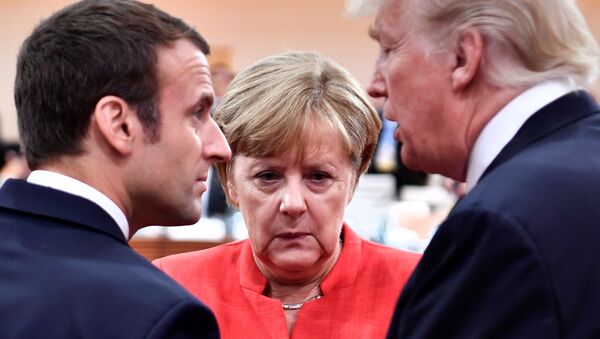Speaking to local media, Zypries said the sanctions had the potential to harm German businesses, and slammed the US for failing to directly coordinate with the European Union and constituent Member States before pushing ahead with the program, as it did in 2014. In response, she said, Germany could pursue countersanctions, which would in turn precipitate a trade war — an eventuality she acknowledged would be "very bad" for both Europe and the US.

The new sanctions bill includes a number of measures that restrict and/or outright ban European involvement with Russian firms and projects, such as the Nord Stream 2 gas pipeline, which would run from Russia to Europe through the Baltic Sea.
Her comments echoed the Association of German Chambers of Commerce and Industry's suggestions that new sanctions against Russia would have a negative impact on Europe's energy security and hurt the German economy, and moreover appeared to favor US firms and Foreign Ministry spokesman Martin Schaefer's plea that anti-Russian sanctions must not become a "tool of industrial policy" pursued solely in US interests.
"In our opinion, it's not in America's right to judge or stipulate which way European companies may engage in cooperation with any third parties — particularly Russian energy companies," he said.
The French Foreign Ministry has issued much the same line, objecting to the proposals on the grounds it affected companies outside the US, which is outside the scope of US law. In a statement, the Ministry suggested national and bloc-wide laws may need to be amended to ensure US policy cannot directly infringe upon its own.
Austrian Chancellor Christian Kern said the sanctions were completely unacceptable as they mixed political and economic interests, and European Commission President Jean-Claude Juncker has said: "America First cannot mean European interests come last."
While yet to issue an official statement on the matter, Italy is also likely to back countermeasures —the country's largest energy company, Eni, intends to commence drilling in the Russian sections of the Barents and Black Seas. Around 30 percent of the firm's natural gas is supplied by Russia.
European affairs analyst Yannis Koutsomitis is likewise adamant the sanctions not proceed.
"US lawmakers are taking a very hard approach to US/Russia relations, which is the wrong way to go about things. Right now, more dialog is needed to reach a common ground on difficult issues, rather than hitting the European energy sector. Europe is dependent on Russia in this regard, and will be for many years. If there is a disruption in cooperation between the two in the sector, it will have a huge impact on energy prices in the EU. We're facing a very delicate situation right now," Mr. Koutsomitis told Sputnik.
He added that while German officials have spoken of a potential trade war, Trump has previously done so himself — again Mr. Koutsomitis feels this is the "wrong" approach, and if the US feels it is neglected in world trade, it should negotiate better settlements, rather than issuing threats and conducting a trade war, in which "everyone would lose."
"There's an overreaction in the US Congress regarding approaches to Russia. Russia could play a strong role in bridging the gaps between Europe and the US. We should find ways to bridge differences, rather than putting new obstacles in the way of reconciliation. The US will suffer from these sanctions as well," Mr. Koutsomitis concluded.
Of course, the sanctions coming into effect is dependent on President Donald Trump's signature. Kremlin spokesperson Dmitry Peskov has said Russian leaders are neither cynical nor optimistic on the question, and will only respond if and when the sanctions are inked. However, White House Communications Director Anthony Scaramucci said July 27 that Trump may either sign the US bill on anti-Russian sanctions — or negotiate an "even tougher deal against the Russians."


